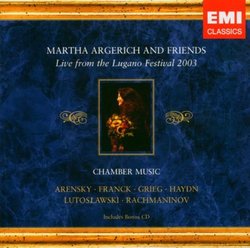| All Artists: Martha Argerich Title: Martha Argerich & Friends Live from the Lugano Festival, 2003 Members Wishing: 0 Total Copies: 0 Label: EMI Europe Generic Original Release Date: 1/1/2005 Re-Release Date: 7/18/2005 Album Type: Import Genre: Classical Styles: Chamber Music, Historical Periods, Classical (c.1770-1830) Number of Discs: 3 SwapaCD Credits: 3 UPC: 724356297029 |
Search - Martha Argerich :: Martha Argerich & Friends Live from the Lugano Festival, 2003
 | Martha Argerich Martha Argerich & Friends Live from the Lugano Festival, 2003 Genre: Classical
|
Larger Image |
CD Details |
CD ReviewsYet again, the best live chamber music on the current scene Santa Fe Listener | Santa Fe, NM USA | 03/15/2009 (5 out of 5 stars) "Here is one of the earliest and most varied chamber music collections from Martha Argerich and friends, taped at the Lugano music festival in 2003. As always, we're given summer music-making of the highest quality. Althoug the tempestuous Argerich isn't present all the time, her spontaneous, emotional approach inspires everyone else. Any lover of chamber music, especially the byways that lead away from the usual masterpieces, will be richly rewarded.
Amazon has left out the composers, so here's a program lisitng for the 3 CDs: CD 1: Piano Trio No.23 in G (Haydn). Six Morceaux for four hands op.11 (Rachmaninov). Cello Sonata in A op.36 (Grieg). CD 2: Piano Trio No.1 in D op.32 (Arensky). Paganini Variations for two pianos (Lutoslawski). Piano Quintet in F (Franck). Bonus CD (last night of the festival): Two Tangos for two pianos (Piazzolla). Improvvisazione sopra un tempe dal primo concerto per pianoforte e orchestra di LV Beethoven (Piazzolla). Oblivion (Piazzolla). La Cumparsita (Matos-Rodriguez / Bossa. Musica della tradizione zigana ungherese e rumena. The late Haydn piano trio that begins the set is one of a handful where the violin and cello have more to do than double the piano. Here the violin steps out quite prominently -- the cello snoozes throughout, however -- and there's a swirling "gypsy rondo" to add piquancy at the end. Argerich plays a stellar role in the virtuosic piano part and then reappears for six piano duets by Rachmaninov. These are "morceaux" (tidbits), simple occasional pieces written when the composer was only twenty-one. Argerich has a passion for two-piano and four-hand music, and everything is done beautifully here, however minor the pieces are. CD 1 concludes with an intense, lyrical reading of Grieg's surprisingly stormy Cello Sonata, with Gautier Capucon as cellist. CD 2 features two major works. The Arensky Piano Trio No. 1 boasts one completely arresting movement, the slow Elegia written in memory of a dead friend, its soaring melody as intoxicating as anything by Tchaikovsky, on whose own Pirano Trio this one is obviously modeled. There's also a buoyant, quicksilver Scherzo, but elsewhere the melodic material is second-rate. The other major work is the Franck Piano Quintet, a one-off that scandalized his contemporaries with its overt eroticism (Saint-Saens played piano at the premiere, only to sotrm off the stage in puritanical outrage). Now that we are well past the Victorians, if not puritanism, there's nothing here to make anyone blush, but this is certainly a passionate, even fervid work that does its best to roll around on the Persian carpet. Argerich appears in neither piece, but the two pianists who do, Polina Leschenko (Arensky) and Alexander Gurning (Franck), ignite fires in her place. Their famous mentor appears briefly for another two-piano piece, Lutoslawski's riotous take on the 24th caprice of Paganini (yes, that one), which packs a modernist wallop for all of five minutes, enough time to squeeze in 11 variations and a finale. The bonus CD features tangos and gypsy music in various high-spirited combinations, all minus Argerich. This is unique among all the Lugano collections (seven by my count, including the 2008 edition, which hasn't appeared in the U.S. yet) and features music by the 20th-century master of the tango, Astor Piazzolla, whose innovations were so incendiary to traditionalists in Argentina that death threats drove him into exile. (There are too many rap artists for me to duplicate the feat.) In sum, this installment includes no masterpieces from the Austro-German tradition except, possibly, the Haydn trio, but everything else is so superbly played that a high level of musical excitement is sustained throughout. And you get to tango off into the sunset. " |

 Track Listings (12) - Disc #1
Track Listings (12) - Disc #1